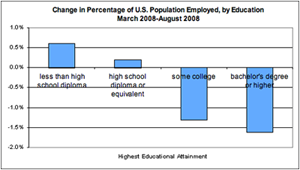Course & Workshop Schedule
Please note that this calendar is designed to be flexible: we may make changes along the way, depending on your interests and the needs of the class. Should you miss a class, you are responsible for knowing about—and adjusting for—any changes. Professional protocols and collegiality call for you to alert us if you’ll be missing on a day when we’re having a peer-editing workshop or when you are scheduled to present materials.
![]() Week One: Tuesday
Week One: Tuesday
1/13Introductions, key terms, course goals
|
|
|
| Prepare for Week 2: > “College Degree No Shield” (WP 1/4/2009) > “Should the Obama Generation Drop Out?” (NYT 1/1/2009) and letters > “Seeing Technical Communication From a Career Perspective” (PDF)  |
![]()
Week Two: Tuesday 1/20
Professional research & reading practices
In class: Discussing articles, theories, contexts, and materials for professional communication, and recent developments; in-class writing
Due: Career Memo
Prepare for Week 3: Pavlis cohorts prepare planning memos for potential projects (3), and one theory memo, discussing — depending on your priorities — theories of communication and technology that might inform your work. These areas may include intercultural communication, technology research, diffusion, and adaption, and the institutional roles we play on such projects.The possible disabilities-related project group will compose individual memos exploring the feasibility of the team project.
![]()
Week Three: Tuesday 1/27
Research, reading, and writing practices in organizational and professional settings
In class: Planning-memo presentations; audience analyses; diffusion of technological innovations
Due: Project planning memos
Prepare for Week 4: ethnographic methods and materials; read “How Documents Engage Readers’ Thinking and Feeling” (PDF)
![]()
Week Four: Tuesday 2/3
Making Work Visible
In class: Two-minute ethnography presentationsDue: project ethnography
Prepare for Week 5: Needs Assessments & Analyses; Background — Woolever, 9-75.
Background on Needs Assessments:A needs assessment is a “systematic exploration” designed to “identify the gaps” between “what is” and “what ought to be”:
1. Learning about the organization for which the assessment is being conducted, in our case, via ethnography
2. Acquiring knowledge about the issues to be assessed; i.e, research
3. Investigating the relationship between the clients, customers, consumers, and technology and the organization’s services, products, administration, or environment; in our case, a contextual analysis
4. Administering the needs assessment — i.e. conducting surveys, interviews, and focus groups
5. Reporting the results of the needs assessment
![]()
Week Five: Tuesday 2/10
Needs Assessments & Analyses
In class: Two-minute Needs Assessments & Analyses presentations
Due: Needs Assessments & Analyses
Prepare for Week 6: Project Proposals and Research Components; Background — Woolever, 347-384.
![]()
Week Six: Tuesday 2/17
Project Proposals & The Diffusion of Innovations
In class: Two-minute proposal presentations
Due: Project Proposal and Preliminary Research Report; Background — Woolever, 247-266.
![]()
Week Seven: Tuesday 2/24
Project Iteration #1 and Editing Workshop
In class: Editing Workshop
Due: Iteration #1; Background — Woolever, 111-157
![]()
Week Eight: Tuesday 3/3
In class: Editing Workshop
Due: Iteration #2; Background — Woolever, 157-166
March 7-15th Spring Break
![]()
Week Nine: Tuesday 3/17
In class: Editing Workshop: readability
Due: Iteration #3
![]()
Week 10 Tuesday 3/24
In class: Editing Workshop: usability
![]()
Week 11: Tuesday 3/31
In class: Editing Workshop
Reading: Selection from Rogers’s Diffusion of Innovations
![]()
Week 12: Tuesday 4/7
In class: Editing Workshop: typography and proofreading
Due: Diffusion research background paper
![]()
Week 13: Tuesday 4/14
In class: Editing Workshop
![]()
Week 14: Tuesday 4/21
Project Presentations